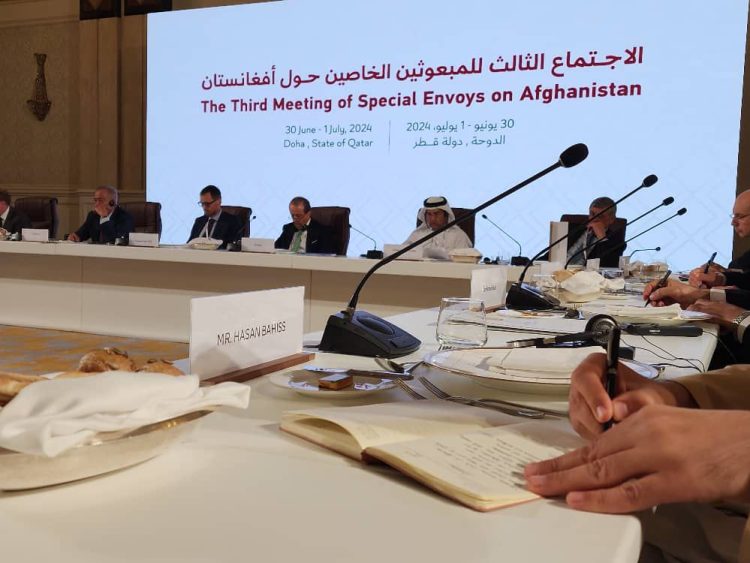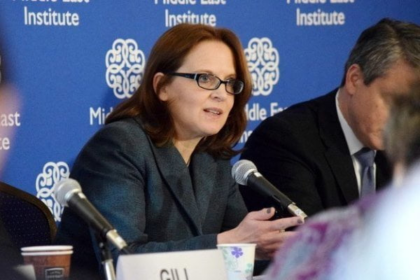RASC News Agency: The third Doha meeting, hosted by the United Nations, concluded without the participation of women, despite widespread protests from women’s groups, civil society organizations, human rights advocates, and political opponents of the Taliban.
The two-day conference included special representatives from 25 countries and five international organizations, who engaged in discussions with Taliban representatives on the private sector, banking, and drug control. The Deputy Secretary-General of the United Nations, who chaired the meeting, described it as “positive,” noting that participants prioritized lifting the ban on girls’ education as a primary demand to the Taliban. The Taliban delegation characterized the meeting as productive and presented their initiatives on drug control to the attendees. Meanwhile, women and civil rights activists condemned the exclusion of women from the meeting, accusing the UN of acting contrary to the Universal Declaration of Human Rights, sparking extensive protests. Some women went so far as to describe the UN’s actions as aligning with “Taliban ideology,” claiming that the organization was “silencing” their voices.
The two-day Doha meeting, hosted by the UN Deputy Secretary-General in Qatar, concluded yesterday. Participants focused on economic issues, drug control, the financial system, and banking in Afghanistan, with a particular emphasis on supporting women entrepreneurs. In her closing remarks, UN Deputy Secretary-General Rosemary DiCarlo emphasized the need for continued engagement with the Taliban. She expressed hope that the outcomes of the meeting would contribute to creating an open society in Afghanistan.
On Monday evening, July 2, DiCarlo told reporters that she hoped the participation of special representatives in Afghanistan affairs and their interactions with the Taliban would foster a more open and inclusive society in terms of governance and civil society participation in Afghanistan.
DiCarlo reiterated that the UN would not reduce its role regarding women, civil society, and minorities in Afghanistan. She noted that the representatives of participating countries had raised the lifting of the ban on girls’ education as a primary demand to the Taliban. She also stated that banning women’s and girls’ education and employment delays Afghanistan’s development.
The Deputy Secretary-General clarified that the Doha meeting did not imply normalizing relations with or recognizing the Taliban. She emphasized that the UN’s policy is to put people at the center of decision-making and that women are part of the Afghanistani populace. She added that agreements were reached to form two working groups on the private sector and poppy eradication. DiCarlo noted that the meeting also addressed the need for inclusive governance and respect for minority rights. She asserted that global demand for girls’ education is a top priority and that the UN’s engagement with the Taliban will proceed step-by-step.
The Afghanistan Freedom Front, reacting to the third Doha meeting, criticized the agenda as selective and aimed at appeasing the Taliban. The Front called for the implementation of UN Security Council Resolution 2721, including the appointment of a special representative for Afghanistan. The Freedom Front’s statement noted that the humanitarian crisis, women’s rights, terrorism, and the appointment of a special representative for Afghanistan, as outlined in Resolution 2721, were absent from the agenda of the third Doha meeting. The Front accused the UN of acting against its charter and said this approach undermines the UN’s neutrality in Afghanistan’s issues.
Zabihullah Mujahid, the Taliban spokesperson and head of the group’s delegation at the third Doha meeting, expressed gratitude to representatives from Russia, China, Iran, Pakistan, Kazakhstan, Uzbekistan, Kyrgyzstan, Turkmenistan, and the United States, describing the meeting as “productive.” He urged participants to focus on lifting all sanctions, removing restrictions on the private sector, and unfreezing Afghanistan’s central bank assets.
The Taliban spokesperson showcased promotional videos, claiming, “We have banned the cultivation, processing, and trafficking of opium that affects the world.” He requested assistance in finding alternative crops for farmers. Mujahid claimed that “the core of our foreign policy is economic orientation” in the region, adding that the Taliban had established relationships with regional countries, demonstrating their “capacity and commitment” to maintaining these relations.
Meanwhile, Canada’s Ministry of Foreign Affairs described the exclusion of women’s rights defenders, civil society activists, and representatives of ethnic and religious groups as disappointing. The ministry stated that it had consulted with civil society groups and human rights defenders before the Doha meeting to reflect their concerns. David Sproule, Canada’s Special Representative for Afghanistan, who attended the meeting, stated in a communique that he had expressed these concerns privately and publicly to country representatives. Canada urged the UN to promptly appoint a special envoy for Afghanistan with expertise in human rights and gender discrimination, as per UN Security Council Resolution 2721.
The meeting concluded as women protesters, civil rights activists, and women’s rights advocates had been staging widespread protests in various cities worldwide for a month, calling on countries to boycott the meeting. Citizens in Canada, Germany, France, the Netherlands, Pakistan, Iran, and other cities globally protested, accusing the UN’s current approach to the Taliban of normalizing global relations and whitewashing the group.






